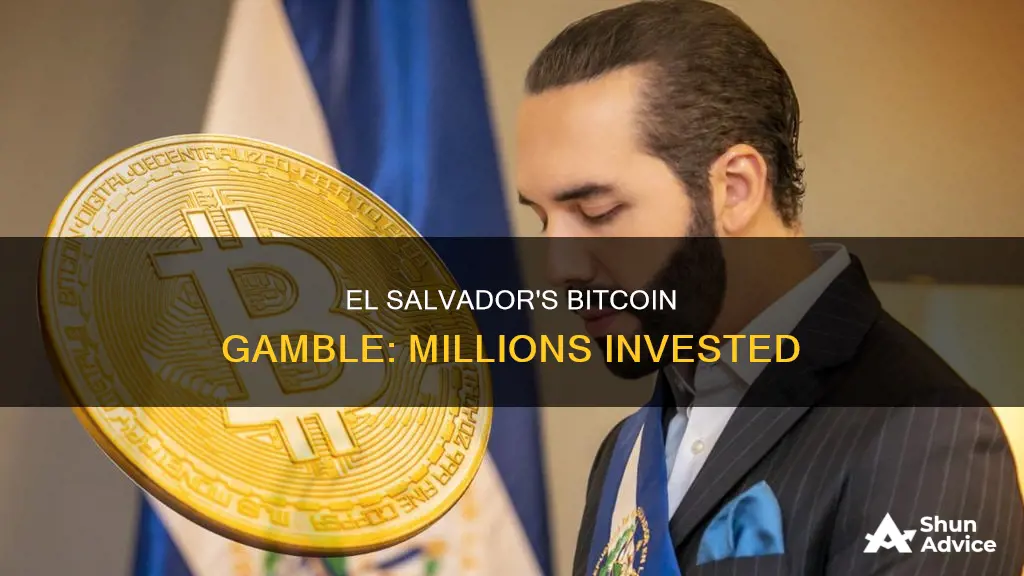
El Salvador's investment in Bitcoin has been a controversial topic since the country became the first in the world to adopt the cryptocurrency as legal tender in 2021. The country's president, Nayib Bukele, has been a prominent bitcoin maximalist and has made the cryptocurrency a central plank of his campaign, touting it as a way to improve the economy and make banking easier for Salvadorans. However, the decision has drawn criticism from both international financial experts and within El Salvador due to the volatility of Bitcoin and its environmental impact. While there are no official records of El Salvador's Bitcoin purchases, it is estimated that the country has spent around \$375 million on Bitcoin as of October 2022, with holdings valued at \$173 million in March 2024.
| Characteristics | Values |
|---|---|
| Total amount spent on Bitcoin | $375 million |
| Amount lost on Bitcoin | $60 million |
| Amount spent on Bitcoin between September 2021 and January 2022 | $85.5 million |
| Number of bitcoins purchased between September 2021 and January 2022 | 1,801 |
| Value of bitcoins purchased between September 2021 and January 2022 | $66 million |
| Number of bitcoins purchased as of September 2023 | 2,300 |
| Number of bitcoins purchased as of November 2023 | 2,744 |
| Number of bitcoins purchased as of March 2024 | 2,848 |
| Value of bitcoins purchased as of March 2024 | $173 million |
| Number of bitcoins purchased as of August 2024 | 2,762 |
| Value of bitcoins purchased as of August 2024 | $115 million |
What You'll Learn

El Salvador's bitcoin portfolio
The exact size of El Salvador's bitcoin holdings is unknown, as there is no public government record. However, various sources and estimates provide an insight into the country's bitcoin portfolio.
In November 2022, President Bukele announced a country-level dollar-cost averaging plan, stating the country's intention to buy one bitcoin every day. At that time, El Salvador already owned 2,381 bitcoins, purchased at an average price of around $44,300, with a market price of $19,000, resulting in a loss of about $60 million. Assuming the country continued to purchase one bitcoin per day, El Salvador's holdings would have reached 2,744 bitcoins by November 14, 2023, with an average purchase price of approximately $41,800.
In March 2024, President Bukele took to social media to address critics of the country's bitcoin investment strategy, stating that El Salvador held more than 40% unrealized profits on its bitcoin investments. He claimed the country's treasury held 2,848 bitcoins, valued at roughly $173 million, and that they had no intention of selling.
'Nayibtracker.com', an unofficial website tracking El Salvador's bitcoin portfolio based on Bukele's social media posts, estimated the country's bitcoin holdings at $121.6 million, with an initial investment of $119.8 million, resulting in a 1.5% return.
Despite criticism and warnings from international financial institutions, El Salvador has continued to hold and, at times, increase its bitcoin investments. The country's bitcoin portfolio has experienced losses during market downturns but has also seen profits during bullish cycles, with reports in December 2023 suggesting the country's bitcoin was in the black.
Should You Invest $100 in Bitcoin?
You may want to see also

Bitcoin's impact on the economy
El Salvador's bitcoin experiment has had mixed results. While it has attracted foreign investment and increased tourism, the country's economy has continued to struggle, with low economic growth and a high deficit. Bitcoin's volatility has also introduced unnecessary risk and instability to El Salvador's underdeveloped economy, and its anonymity has made it easier to engage in money laundering and criminal activities.
Bitcoin and other cryptocurrencies have had a significant impact on the global economy. They have improved financial inclusion for underserved and unbanked populations, providing an alternative to traditional financial systems that have failed many individuals. Cryptocurrencies also have low transaction costs, making them a viable investment vehicle. Blockchain, the technology underlying cryptocurrency, has improved cross-border transactions and increased security and transparency.
However, there are also concerns about the impact of Bitcoin on the economy. One of the main concerns is the volatility of Bitcoin's price, which can lead to significant losses for investors and introduce instability into the wider economy. Another concern is the environmental impact of Bitcoin mining, which uses large amounts of energy and contributes to pollution if powered by fossil fuels.
Overall, Bitcoin and cryptocurrencies have had both positive and negative impacts on the economy. While they have improved financial inclusion and transaction efficiency, they have also introduced new risks and challenges that need to be carefully managed.
Bitcoin's impact on El Salvador's economy has been mixed. On the one hand, it has attracted foreign investment and increased tourism to the country. On the other hand, El Salvador's economy continues to struggle, with low economic growth and a high deficit. Bitcoin's volatility has also been a source of risk and instability, and its anonymity has made it easier for criminal activities to take place.
The Crypto Investment Conundrum: Which Coin to Choose?
You may want to see also

The IMF's stance on El Salvador's bitcoin investment
El Salvador's adoption of bitcoin as legal tender has been a controversial topic, with critics pointing to the volatility of the cryptocurrency, its environmental impact, and the lack of transparency in the government's fiscal policy. The International Monetary Fund (IMF) initially advised El Salvador to refrain from using bitcoin as legal tender, citing risks to the country's financial stability and consumer protection.
However, in recent statements, the IMF has acknowledged that the anticipated risks associated with El Salvador's bitcoin adoption have not materialized. While the IMF still recommends reconsidering the expansion of government exposure to bitcoin, there is a recognition that further efforts to enhance transparency and mitigate potential fiscal and financial stability risks are needed. The IMF's statement comes after years of criticism regarding El Salvador's decision to make bitcoin legal tender in 2021.
El Salvador's government, led by President Nayib Bukele, has continued to promote bitcoin and its potential benefits for the country's economy. Bukele has touted increased tourism and a positive impact on businesses, claiming that bitcoin has fueled a 95% increase in tourism to El Salvador. However, critics argue that bitcoin has not brought significant benefits and that the government's spending on bitcoin could be better used elsewhere.
As of 2024, El Salvador holds over 5,800 BTC, valued at approximately $332 million, and continues to acquire more. The outcome of the IMF's negotiations with El Salvador and the impact of its bitcoin investment on the country's economy remain to be seen.
Jack Ma's Bitcoin Investment: Did He Buy?
You may want to see also

Bitcoin's impact on tourism
El Salvador's adoption of Bitcoin as legal tender has had a notable impact on tourism in the country. In 2023, President Nayib Bukele credited the Bitcoin legal tender law with fuelling a 95% increase in tourism to El Salvador. Official government estimates put the increase in tourism at 30% since the Bitcoin Law took effect. This increase has been attributed to the country's appeal as a destination for "bitcoin tourists".
The impact of Bitcoin on tourism in El Salvador is evident in the number of visitors to the country. In the first half of 2022, there were 1.1 million visitors, an 82.8% increase compared to the same period in 2019. This surge in tourism is notable, especially considering the bear market for Bitcoin during this period. The World Travel Organization recognised El Salvador as "one of the countries with the best rate of tourism recovery in the region as of January 2022".
The use of Bitcoin in El Salvador has been promoted by President Bukele, who claimed it would improve the economy and encourage foreign investment. In 2022, more Salvadorians had Bitcoin wallets than bank accounts. However, the adoption of Bitcoin has also faced criticism due to the volatility of Bitcoin, its environmental impact, and a lack of transparency regarding the government's fiscal policy.
While Bitcoin has attracted tourists to El Salvador, its impact on the wider economy is less clear. Some reports suggest that Bitcoin has not had a significant impact on the economy, with low adoption among Salvadorians and businesses. Additionally, the country faces economic challenges, including slow growth, high public debt, and a large deficit.
Overall, Bitcoin has had a positive impact on tourism in El Salvador, contributing to a significant increase in visitor numbers. However, the long-term effects of Bitcoin on the country's economy remain to be seen.
The Ultimate Guide to Investing in Dogecoin
You may want to see also

Bitcoin's impact on remittances
El Salvador's adoption of Bitcoin as legal tender was partly motivated by the potential to reduce remittance fees. Remittances accounted for 23% of the country's GDP in 2020 and are often sent through money transmitters, which operate on an in-person basis.
The country's president, Nayib Bukele, claimed that Bitcoin would make it easier for Salvadorans living abroad to send money to their relatives in the country. To encourage the use of Bitcoin, the government launched the Chivo Wallet app, which offers no-fee transactions and quick cross-border payments. The government also distributed $30 in Bitcoin to people who signed up to use the app, at a cost of up to $75 million.
However, the adoption of Bitcoin in El Salvador has faced several challenges and criticisms. There is a lack of trust in the app and Bitcoin due to concerns about anonymity and security. Additionally, the volatility of Bitcoin has made paying remittances more difficult and expensive for many Salvadorans. The fees associated with Bitcoin transactions are several times higher than traditional remittance methods.
According to a survey by the Chamber of Commerce and Industry of El Salvador, 86% of businesses have never made a sale in Bitcoin, and only 20% of businesses accept it as payment, despite the law mandating that all merchants accept the cryptocurrency. Another survey found that only 1% of remittances were sent in Bitcoin.
Overall, while El Salvador's Bitcoin adoption may have had a positive impact on tourism and the country's image, it has not significantly improved the remittance process. The country continues to face economic challenges, and the use of Bitcoin for remittances remains limited.
Bitcoin: Currency or Investment?
You may want to see also
Frequently asked questions
El Salvador has invested heavily in Bitcoin, with the exact amount being unclear as there is no public government record. However, it is estimated that the country has spent around $375 million on Bitcoin.
El Salvador's president, Nayib Bukele, made Bitcoin legal tender in the country to improve the economy by making banking easier for Salvadorans and encouraging foreign investment.
The success of El Salvador's investment in Bitcoin is debated. On the one hand, the country has faced economic challenges, including slow growth, high deficits, and increasing public debt. On the other hand, Bitcoin has attracted tourists and boosted the country's profile, with some businesses reporting an increase in revenue from cryptocurrency tourists.
The value of El Salvador's Bitcoin investment has fluctuated due to the volatile nature of the cryptocurrency market. At times, the country has faced significant losses on its Bitcoin holdings, with a $60 million loss reported in October 2022. However, during bullish market cycles, the value of the investment has increased, and as of December 2023, the country's Bitcoin portfolio was near break-even.
The International Monetary Fund (IMF) and other critics have warned that El Salvador's adoption of Bitcoin as legal tender carries risks for the country's financial stability, market integrity, and consumer protection. The volatile nature of Bitcoin's price also introduces uncertainty and potential losses for the country's economy. Additionally, there have been concerns about the lack of financial literacy and access to technology needed to utilize Bitcoin effectively in El Salvador.







